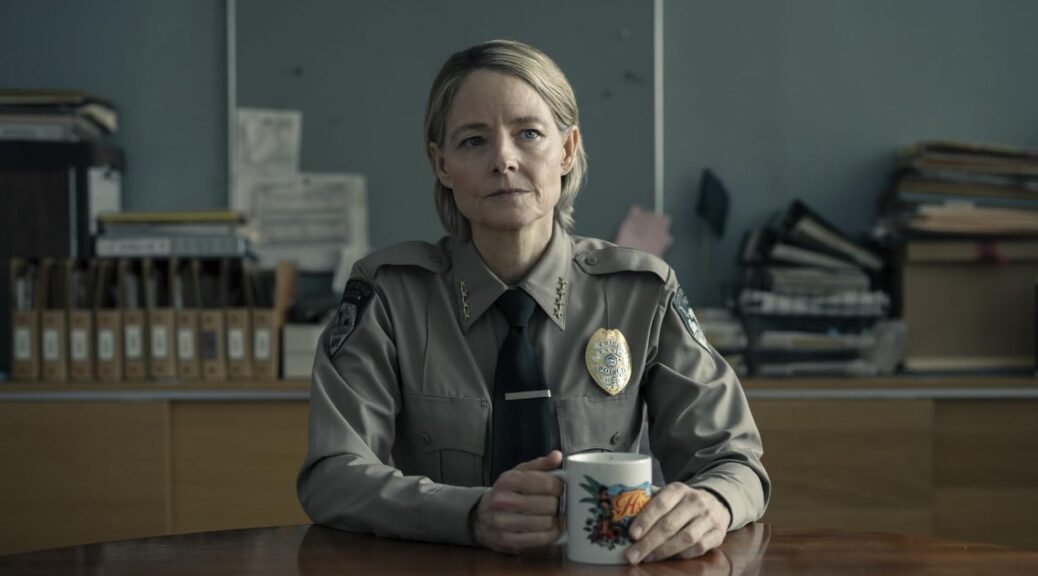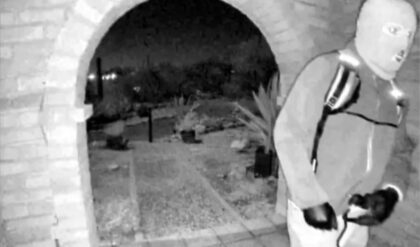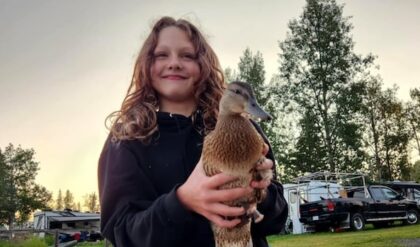The following article contains major spoilers for True Detective: Night Country.
“There’s something almost subversive about being in a small town and having slept with everybody’s husband,” says Jodie Foster, with the biggest, cheekiest smirk.
The two-time Oscar winner, and current nominee, is perched at the end of a sofa – hands tucked between her knees, frilly white blouse poking out of a sharp black suit – chatting to me about Liz Danvers, the cold, grieving and sexually indiscriminate cop she plays in True Detective: Night Country; the fourth (and most-watched) instalment of the eerie police anthology series, which has just reached its twisty, thrilling end.

The show is a fierce return to TV for the 61-year-old Silence of the Lambs star. The Alaska-set 6-parter – which follows Danvers and determined trooper Evangaline Navarro (Kali Reis) as they investigate the death of a group of male research scientists and its possible connection to the cold-case murder of indigenous local Annie K – manages to take a story spanning the defrosting of a giant “corpiscle”, a son murdering his father, possible supernatural occurrences and a Tarantino-worthy revenge sequence and turn it into an exploration of grief, PTSD, police corruption, corporate pollution, racism and male ego.
“It’s an extraordinary Greek tragedy,” says Foster, who also executive produced the season. Here, she talks about the show’s shocking final twist, shooting in Iceland and a “panic-inducing” moment on set.
GQ: Let’s get straight to it: that finale. What was your reaction when you first read it?
Jodie Foster: I remember calling upstairs to my wife, and just going: “That was a perfect episode!”. It really brings Navarro and Danvers together. You understand why they care for each other and that their destinies are aligned.
You spend a lot of the episode in ice caves. How were those scenes to film?
It was quite an uncomfortable set. It was hot because we were on a stage. We had on fleeces, hats and gloves, so were actually just boiling. They had to add a little bit of breath in [the edit] so that it looked like we were cold.
I imagine the scene where Danvers falls through the ice into the sea was a challenge to shoot?
That was the scariest day. They built a tank. My boots were weighted, my parka was weighted, everything was weighted, because I had to drop. It was completely dark and I couldn’t wear contact lenses, so I couldn’t see. Everything, except for one small area [of the surface] was closed, so I couldn’t figure out how to get to the top. And, because I was weighted, I couldn’t, even if I tried. Once they cut, a free diver had to come and rescue me and bring me to the surface because I couldn’t find it. It was panic-inducing.
You and Fiona Shaw don’t have any scenes together, but I heard the two of you went out for dinner around Reykjavík a lot. What are your memories of that? Did you know her before?
No, but I had a lot of friends who knew her. We’re kind of the same types, right? We’re older… I was just laughing at her stories. She’s quite the storyteller and has learned poems and can recite poems. But also, you know, Fiona’s like I am. She was really keen on being like: “I can do this, no problem, I can do this.” I felt like she was able to go, “That was really hard!” And I was like, “I know”.
Hard in what way?
She got the worst weather of any of the days. We had these massive wind storms and, on a frozen lake, they’re just like nothing else you’ve ever experienced.
I heard it was so cold at times it was hard to open your mouths?
Yes. The trailer always makes me laugh. I couldn’t talk!
Danvers is someone who’s dealing with grief but also trying to crush down her emotions at all costs. How did you walk that tightrope?
She was somebody who couldn’t access that side of herself. It was a grief that was never allowed to really happen because there’s fear that if she talked about it, or if she went there, that somehow she’d never come back. That is the one thing Danvers and Navarro both have in common.
Was it fun playing a character who has unapologetically slept with most of the men in the town?
Well, that was all Issa [López, the director]. We just saw that as funny because she’s unable to be close to anyone and yet she has this overzealous intimacy thing. It was just great that she wasn’t embarrassed by it.
Let’s talk about the scene in the finale where we learn that the scientists killed Annie to protect their work…
Not only their work, their egos. It wasn’t just, like, “my work is so important”. It was, “this work will save the world, and that is so much more important than this one person’s life”. For me, these men’s egos are really what ended up turning them into murderers.
Often, in detective series, female suffering can feel quite fetishised. How did you avoid that?
You know, it’s a double-edged sword, because you want to bring attention to something that’s real. Missing and murdered indigenous women is a real thing. And the crimes go unlooked at, they don’t get solved. You don’t want to pretend it doesn’t exist. But at the same time, having two female police officers who care enough about it to say, “No, we’re going to continue to investigate” and then also having the end with the justice ladies [lab cleaners who avenge Annie’s murder], who have been there all along but [who] we weren’t paying attention to. There’s something beautiful about that.
I think Issa was saying this; their handicap has been that they’re always invisible, but that’s also their superpower as a collective; they see things that other people don’t see, they can bring justice in a way that’s invisible.
Despite being more watched than any other True Detective, there has been a lot of sexist backlash to this series on Reddit. Is that frustrating?
As I’ve said to Issa: who cares? We’ve had the best reviews of my life. I don’t think there’s any way of looking at this where it’s not a success. We have to be curious, though, about this underground vitriol and grievance and where it’s coming from. We don’t really realise, because we want to make movies about human beings that happen to look like us, but we have all the flags: we’re the two women, we have the Mexican director, we’ve got a story that has to do with global warming and pollution by large corporations. That does tick a lot of boxes in the white male grievance patrol. It’s important for us to think about that: what is going on that there is this vitriol?
The added problem, of course, is that this is an anthology of True Detective. 12 years ago they made an absolutely extraordinary, beautiful show that was exploring toxic masculinity and that happened to dovetail with a sort of weird, underground fear of a cabal of elitist pederasts – which now we recognise as a weird QAnon conspiracy, but at the time it was just like a really good TV show – so that attracted a lot of people that you know, got sucked in by that.
Danvers spends a lot of time trying to stop her daughter Leah from exploring her indigenous roots. Do you see her as outrightly racist?
It’s implicit bias. It’s this idea that, if you embrace your culture, bad things are going to happen to you: you’re not going to go to college, you’re not going to be a successful person. People say: “Oh, my gosh, she’s so awful”. She is awful, but she’s created so that we can understand where that comes from. I mean, I don’t think there’s anybody who really wants their child to tattoo their face. So, even though [to Leah] it is about embracing her culture, to Danvers, it’s like you’re going to mar your face.
I’d love to know, with the very last scene – where Danvers and Navarro are standing by the lake – whether you think Navarro is living or a spirit?
On purpose, you can think whatever you want to think. Everybody has a choice. I’m a logical person, so I think she’s definitely there. It reinforces that idea that Navarro is somebody who’s torn between two things: torn between the real world and the spirit world, torn between two cultures, the Inuit and the Dominican, torn between being a police officer and the community that she’s policing.
Finally, there’s been a lot of chat about the series being peppered with Silence of the Lambs easter eggs. Were they deliberate?
I don’t know if Issa meant to do it with the guy in the hospital, but, I mean, come on! I walked onto the set and the second he said “Hello, Evangeline!”, I was like, “…Issa!” She said it hadn’t occurred to her at the time, but while we were shooting we recognised that there was a similarity.



